In the Time of Corona: The Solace of Art, Music and Literature in Dark Days
In the span of a few months, our world has changed incalculably – and we have been forced to adapt …
In the span of a few months, our world has changed incalculably – and we have been forced to adapt to new ways of living, working, playing, connecting and socializing.
While it is impossible to measure the full scope of these changes, there are perceptible shifts in the market that illustrate how we are collectively navigating the day-to-day reality of a global pandemic.
In recent reports, Spotify, the world’s leading music streaming service, noted that active users had increased by 30% over the previous year. It also noted that searches for “instrumental” or “calm” music had rocketed, and that listeners were making more playlists with “chill” music.
Spotify isn’t the only platform experiencing changes in consumer behavior. In April, Netflix reported its most successful quarter to date, garnering nearly 16 million new subscribers in the first three months of the year.
While there may be a host of explanations for these ballooning trends, including boredom and increased time at home, there may also be something else going on – something that throws into relief how, and in what, we are finding solace as we navigate our current circumstances.
Spotify and Netflix both, in essence, curate and provide access to stories, music and art – and this increase in subscriptions and streaming suggests that we are turning to art now more than ever. To explore this question, UVA Today reached out to University of Virginia faculty and staff, and asked them to speak to the art, music and literature that is bringing them solace in these difficult days.
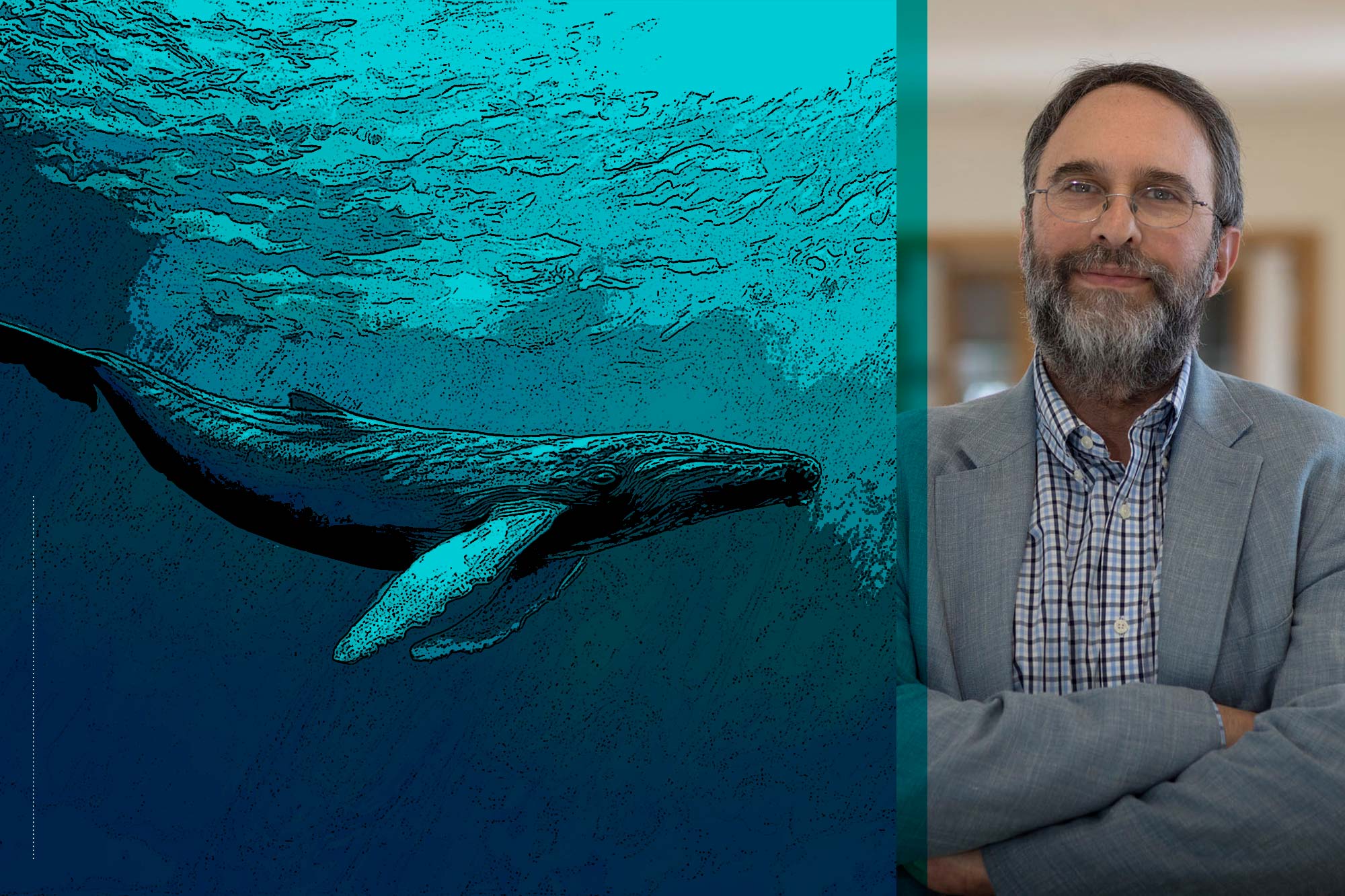 English professor Victor Luftig says a line by Irish poet Moya Cannon about light “drawing a whale north” has stuck with him in these dark days. (Photo by Dan Addison, University Communications)
English professor Victor Luftig says a line by Irish poet Moya Cannon about light “drawing a whale north” has stuck with him in these dark days. (Photo by Dan Addison, University Communications)
I spend a lot of time in Ireland, with my family and UVA students, and I was greatly moved by Ireland’s national – and, really, international – #ShineYourLight initiative, by the way it enlisted artists to invite everyone to unite in simultaneous acts of visible hope. One evening, they asked every household to put on a light (using phones, candles, even Christmas lights), and the government turned on a lot of the public illumination, while artists performed about light on the national broadcasting station. I think it demanded a lot of courage – they were asking children to stay up late, and asking everyone to acknowledge the bleakness of the present situation; when you make everyone conscious of making light like that, you’re signaling that the present norm is the absence of such light – and suggesting what national leadership driven by wisdom (scientific and artistic) might look like. It made me think of Robert F. Kennedy’s quoting Aeschylus at a similarly bleak moment: “In our sleep, pain which cannot forget falls drop by drop upon the heart until, in our own despair, against our will, comes wisdom …”
When you make everyone conscious of making light like that, you’re signaling that the present norm is the absence of such light – and suggesting what national leadership driven by wisdom (scientific and artistic) might look like. – Victor Luftig
That Irish event began with a poem by Moya Cannon, whom our UVA January term Ireland students will all remember meeting; she was alongside a great fiddler named Martin Hayes, and also Glen Hansard, whom U.S. audiences know through the movie “Once,” and her image of light drawing the whale north with its song has stuck with me since. We need beacons just now, and it seems to me the Irish made a big one from coming together, seeing light, and heeding their artists.
Light is what days are made of –
it pulls the daffodil up out of dark earth,
prompts the eagle and the stub-tailed wren to nest
and draws the humpback whale north with its song.
Stones, warm on the morning sea-shore, know it.
Such tempests of grief our sun has scanned
yet light, the sun’s light and compassion’s light,
deep in every soul, eternally draws us on.
– Moya Cannon
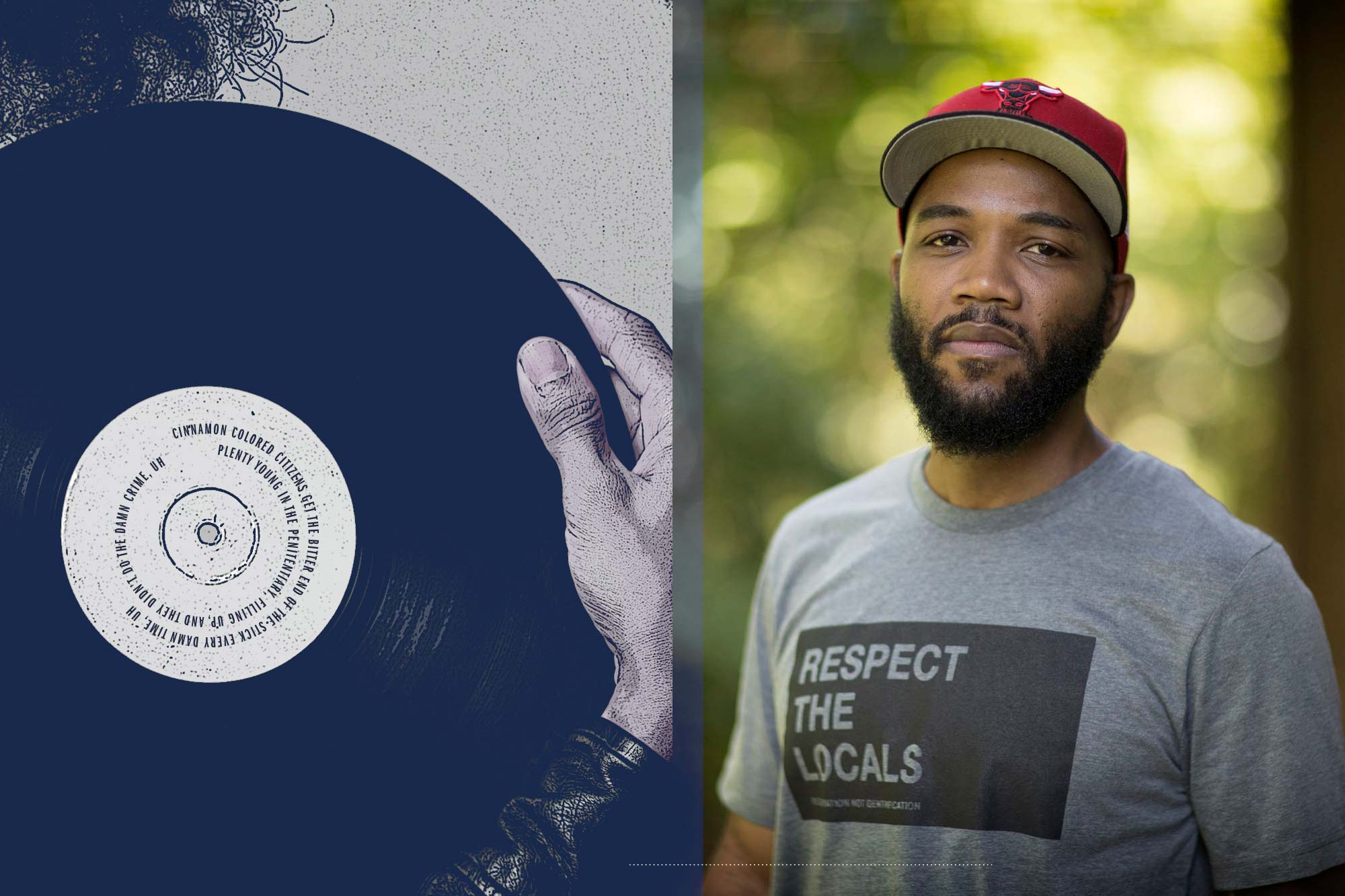 Music professor A.D. Carson has been listening to a playlist he made that features the song “Black Habits II,” by rapper D Smoke. (Photo by Dan Addison, University Communications)
Music professor A.D. Carson has been listening to a playlist he made that features the song “Black Habits II,” by rapper D Smoke. (Photo by Dan Addison, University Communications)
I have been listening to a rap music playlist that I’ve made that includes “I’ll Be There for You / You’re All I Need,” by Method Man and Mary J. Blige; “MUMBO JUMBO,” by Tierra Whack; “Just Might Be OK,” by Lupe Fiasco; and “Get Away” by Big KRIT, among many others. If I had to choose just one song from the list, though, I would say “Black Habits II,” by D Smoke.
I would be lying to say that any writing, music, or art is really getting it done in the ways I would like. – A.D. Carson
All of the songs are kind of dark sounding. “I’ll Be There for You” is probably the most optimistic of the bunch. I feel a hint of solace while listening to them, but I would be lying to say that any writing, music, or art is really getting it done in the ways I would like. “Black Habits II” is dark and mellow. I like the keys. It’s not the same energy as “Black Habits I” (there’s a popular video for that one). While the song, on the whole, is still kind of inspirational, it takes its time getting there. The second verse, both in the lyrics and his delivery of them, carry a lot for me. He raps:
“Cinnamon colored citizens get the bitter end of the stick every damn time, uh.
Plenty young in the penitentiary, filling up, and they didn’t do the damn crime, uh.”
The last verse is excellent, as well.
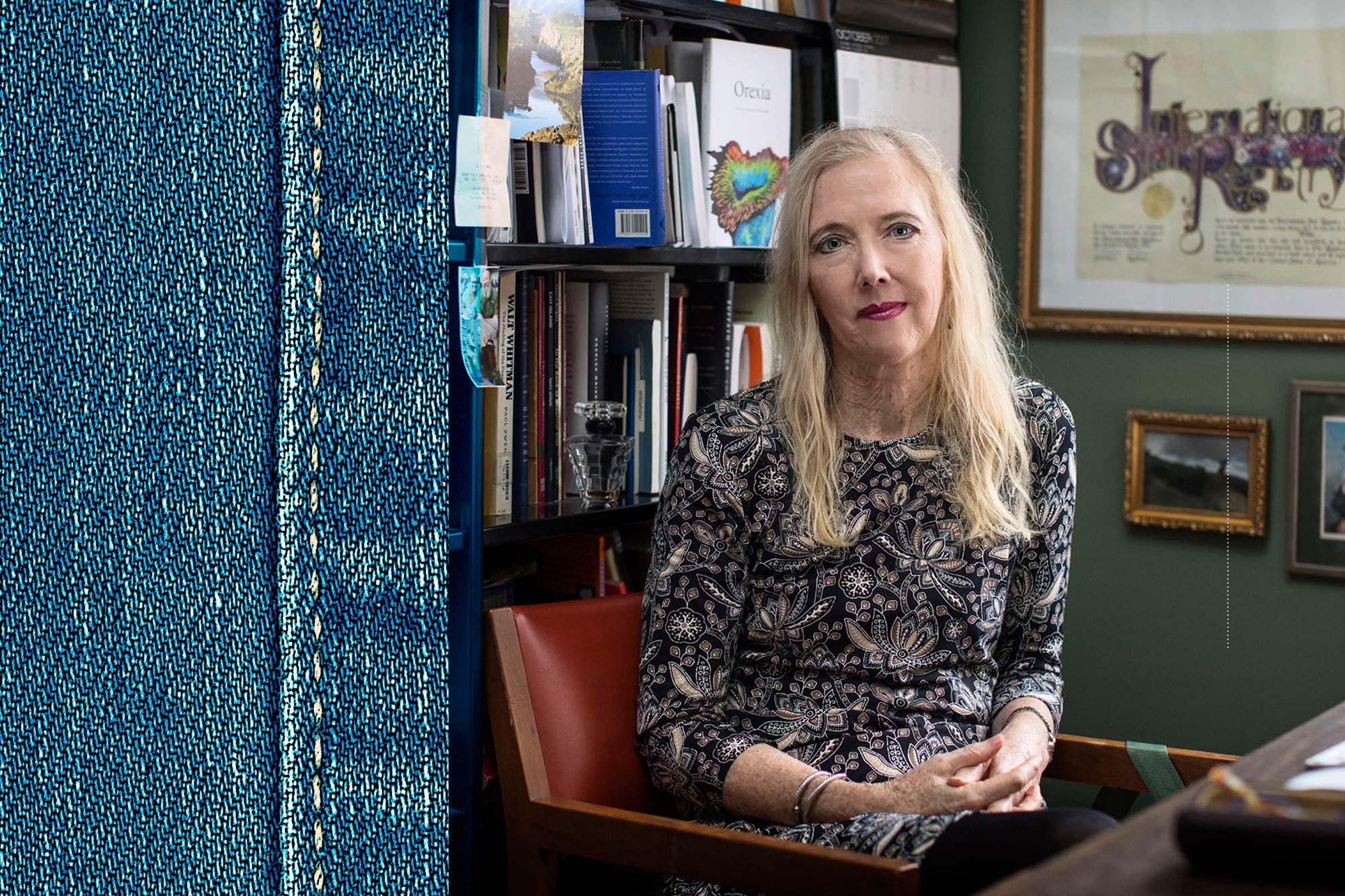 Lisa Russ Spaar has been sending writing prompts to alumni during the pandemic. “I can’t tell you how much receiving and threading together these wonderful alumni poems over the past few weeks has meant to me,” she said. (Photo by Dan Addison, University Communications)
Lisa Russ Spaar has been sending writing prompts to alumni during the pandemic. “I can’t tell you how much receiving and threading together these wonderful alumni poems over the past few weeks has meant to me,” she said. (Photo by Dan Addison, University Communications)
Nearly 20 years ago, I founded the Area Program in Poetry Writing here in the Department of English; its first graduating class of 10 students graduated in 2002. I have kept in touch with the program’s alumni through a periodic newsletter. Once the pandemic really hit, some alumni (doctors, lawyers, Wall Street accountants) began sending me notes saying that they’d like to get back to writing more, now that they had more/different time to do so.
So I wrote to the list of about 180 poetry alums, and sent out a writing prompt. At the end of two weeks, nearly 50 poems had come in, all of them dealing in some way with living in the time of COVID-19.
The words of current and former UVA undergraduate poets shine in a dark time; they attend, console, observe, worry, love, and connect us as a community. – Lisa Russ Spaar
I can’t tell you how much receiving and threading together these wonderful alumni poems over the past few weeks has meant to me. The words of current and former UVA undergraduate poets shine in a dark time; they attend, console, observe, worry, love, and connect us as a community.
So, the short answer is that I’ve been consoled by the brave, beautiful work of my current and former students.
As we must pray for health of body and mind, so we must use our utmost endeavours to reserve and continue it.
– Robert Burton, “The Anatomy of Melancholy”
I take up yoga, find ways I am inflexible that I wasn’t even aware of.
I practice every morning with the ferocity of someone acutely aware her control
has been lost, left with only the body to build, protect.
I am two and a half lines in before I have a child on my lap.
This, and arms latched around my neck are our new shapes,
the colors of our skin paling from less sunlight,
tan lines receding into body. There is something to be said
about the knots we tie around each other, loosely drawing boundaries
that we readjust and tug at, like the masks
a neighbor sewed to keep us safe. I meant to do it myself.
Unpacked my mother’s old machine, pulled and prodded
until I’d threaded bobbin, tension, needle. But it turns out survival doesn’t mean
a new baseline of domestic skill. Maybe I am destined to own, but not use this machine
just like my mother, crafting and hand-stitching my way through life.
There is beauty in an unsteady line. How else to cross this season?
– Jordan Bolden Majewski (2013 graduate of the Area Program in Poetry Writing)
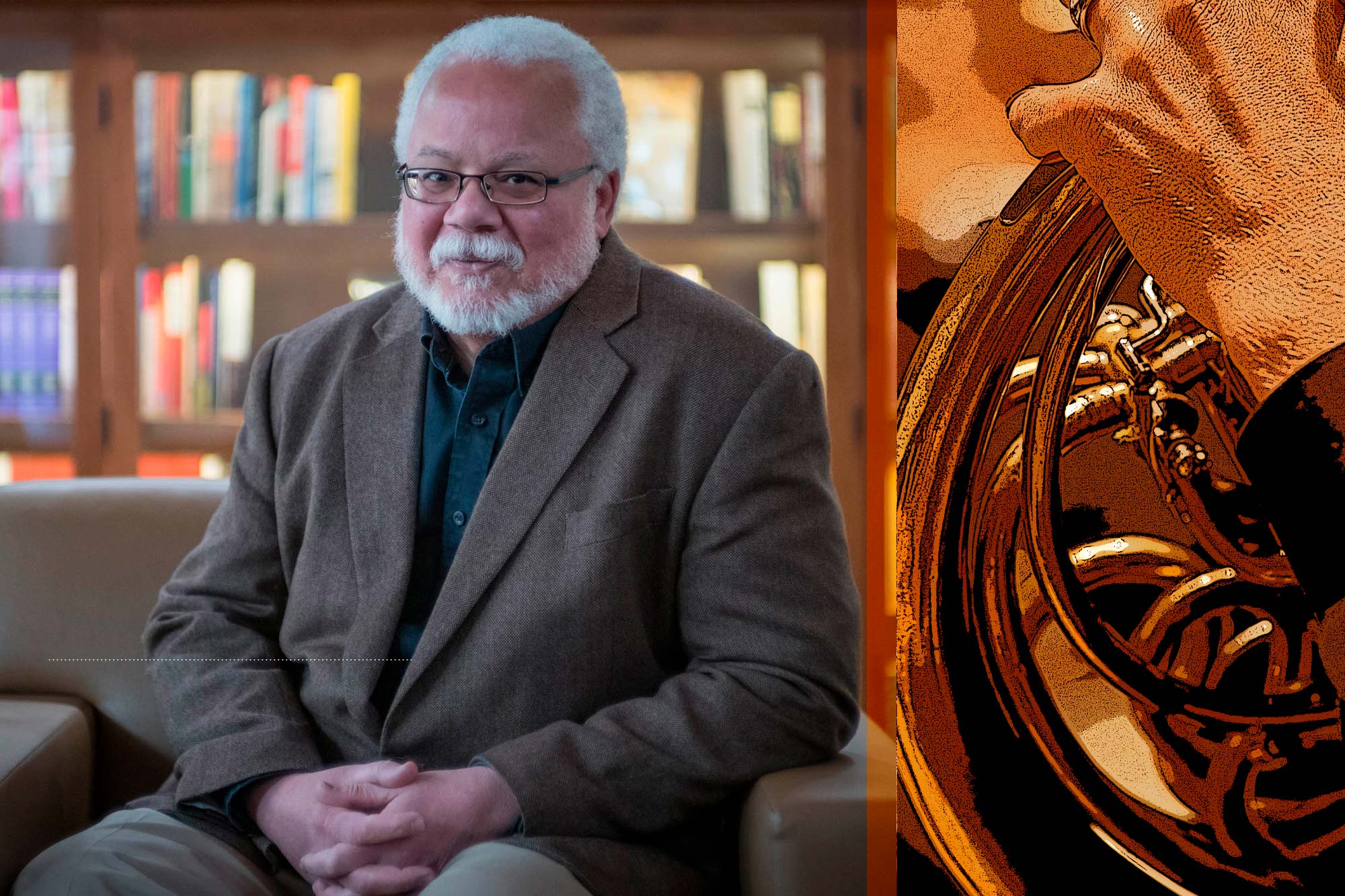 History professor John Edwin Mason has been listening to music and playing his horn for solace. (Photo by Sanjay Suchak, University Communications)
History professor John Edwin Mason has been listening to music and playing his horn for solace. (Photo by Sanjay Suchak, University Communications)
I’m doing very little reading, except for my students’ drafts and final papers and, of course, the news. This long moment of isolation and hunkering down seems to have destroyed whatever powers of concentration I once possessed. Instead I’m listening to a lot of music. A very lot. During the day, it’s background noise – just enough to distract me from the anxiety and anger about the pandemic and the federal government’s shamefully negligent response to it. In the evening, I allow myself to get lost in the music. It bypasses my analytical mind and goes directly to my emotions, which usually have no words attached to them and sometimes bring me to tears. There’s no single work that I turn to. There are some constants – Coltrane, Ellington, and Strayhorn, Bach, Brahm, and Mahler, Brian Blade’s Fellowship Band and the Berlin Philharmonic. I’ve been buying new music, too. Most musicians are out of work and will be until the pandemic ends. The creativity shown in younger jazz musicians that I’ve found on sites like Bandcamp lifts the gloom that can too easily descend on me.
Playing any instrument is an immersive experience. It’s highly physical, especially for brass musicians. It taps the emotions and demands attention from the intellect. During the hour or so that I spend with the horn, I’m wholly engaged with something that feels utterly beyond myself and, of course, beyond the pandemic. It’s usually the best hour of my day. – John Edwin Mason
There’s no single piece of music that I turn to for solace, but there is one activity – playing my horn. After not touching it for several years, in part due to an injury, I picked it up again just before last Christmas. I’m glad I did. Playing any instrument is an immersive experience. It’s highly physical, especially for brass musicians. It taps the emotions and demands attention from the intellect. During the hour or so that I spend with the horn, I’m wholly engaged with something that feels utterly beyond myself and, of course, beyond the pandemic. It’s usually the best hour of my day.
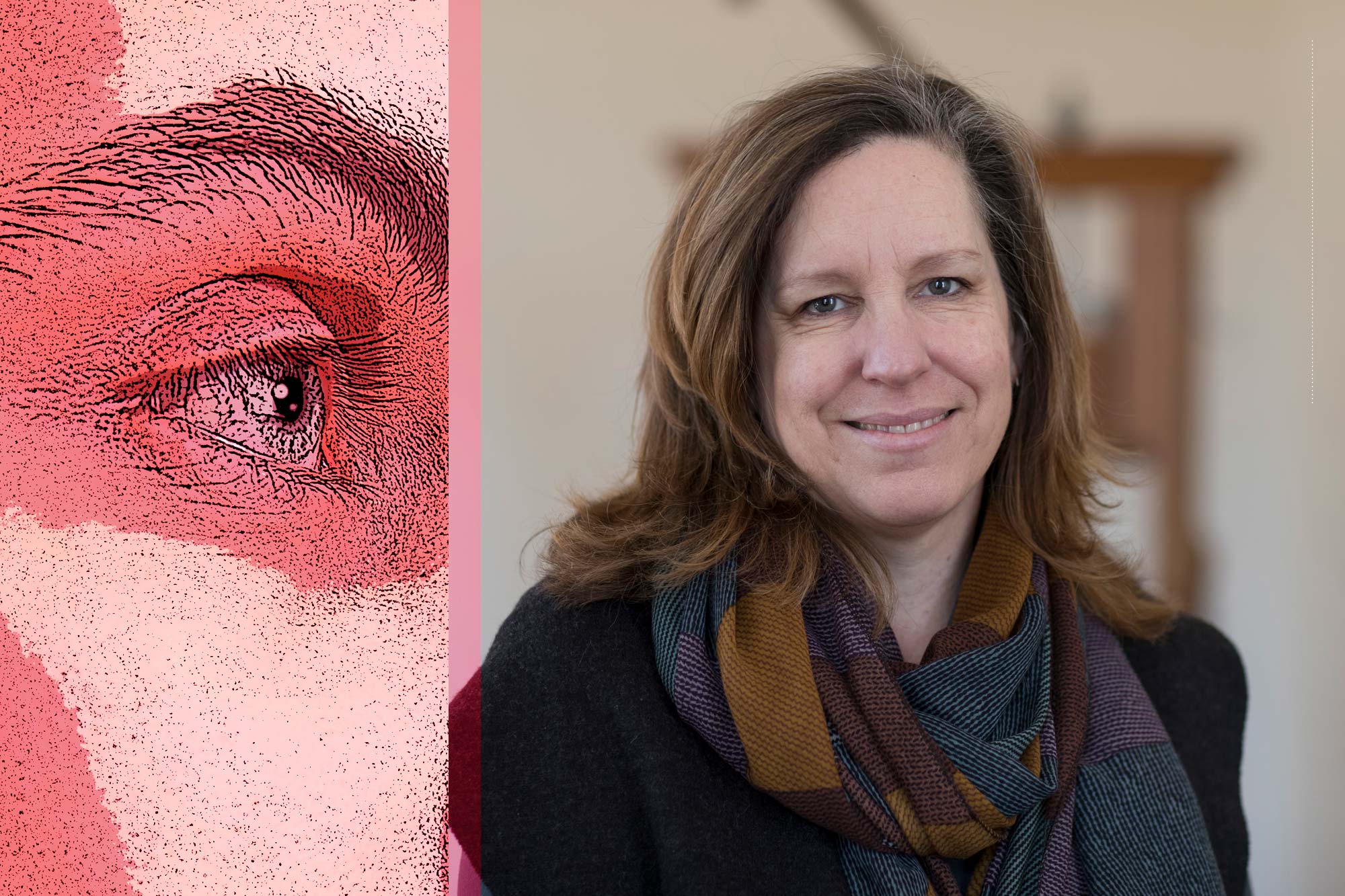 Special Collections curator Molly Schwartzburg says when she is going through times of stress, she turns to Emily Dickinson. (Photo by Dan Addison, University Communications)
Special Collections curator Molly Schwartzburg says when she is going through times of stress, she turns to Emily Dickinson. (Photo by Dan Addison, University Communications)
During this time I have repeatedly found myself reciting Emily Dickinson’s poem that begins, “I saw no Way–The Heavens were stitched–.” When I am going through times of stress or anxiety, I often read Dickinson, because her poems absorb my full attention to the point that I forget everything else. I can become immersed in reading and rereading one of her poems, breaking down and reconstructing her metaphors, rhythmic structures and punctuation. Here’s the poem:
I saw no Way – The Heavens were stitched –
I felt the Columns close –
The Earth reversed her Hemispheres –
I touched the Universe –
And back it slid – and I alone –
A Speck upon a Ball –
Went out upon Circumference –
Beyond the Dip of Bell –
This poem is one of my favorites, so I know it by heart. It is a poem about awe (and, more literally, quite possibly about an eyeball), and begins with a speaker who doesn’t know what to do in the face of a magnificent, massive, unknowable universe, but reaches out to touch it, and then achieves some kind of state of transcendence as a solitary “speck.” Twenty years after first reading this poem, I’m still not sure where the Dip of Bell is, but somehow, I know what it would mean to go out beyond it. This is why I love Dickinson.
This pandemic is terrifying and, in its terrible way, magnificent. Day after day, I have felt a sense of awe as our world shifts in a way I have never experienced. As someone described it to me a few weeks ago, it’s as though the world has been picked up, shaken, and put back down again. Earthquakes, which I felt growing up in northern California, are mind-blowing reminders that stability is an illusion, and this pandemic is like being in an earthquake that rumbles on for months but never becomes routine.
As someone described it to me a few weeks ago, it’s as though the world has been picked up, shaken, and put back down again. – Molly Schwartzburg
But it has also been, for those of us lucky enough to be quarantined at home, a time of unusual solitude. I spent many hours during the first couple of weeks of quarantine preparing my garden for spring, digging in the soil while trying to wrap my head around the news, or taking our dog for long walks on emptied neighborhood streets. Contemplating the possibility of a changed world, while fearing for the safety of my loved ones and wondering when I will be able to see and touch them again, has led me to think in new ways, to step back and look at my life, my community, and the nation from a distance – to see my place in the world differently. I think this poem has been on my mind because it is about encountering something overwhelming and, rather than escaping it, moving through and into it, achieving an entirely new state of consciousness as a result. I don’t know that I will ever reach beyond the Dip of Bell, but Dickinson’s description of the experience has somehow helped me a bit as I try to navigate this moment of radical transformation.
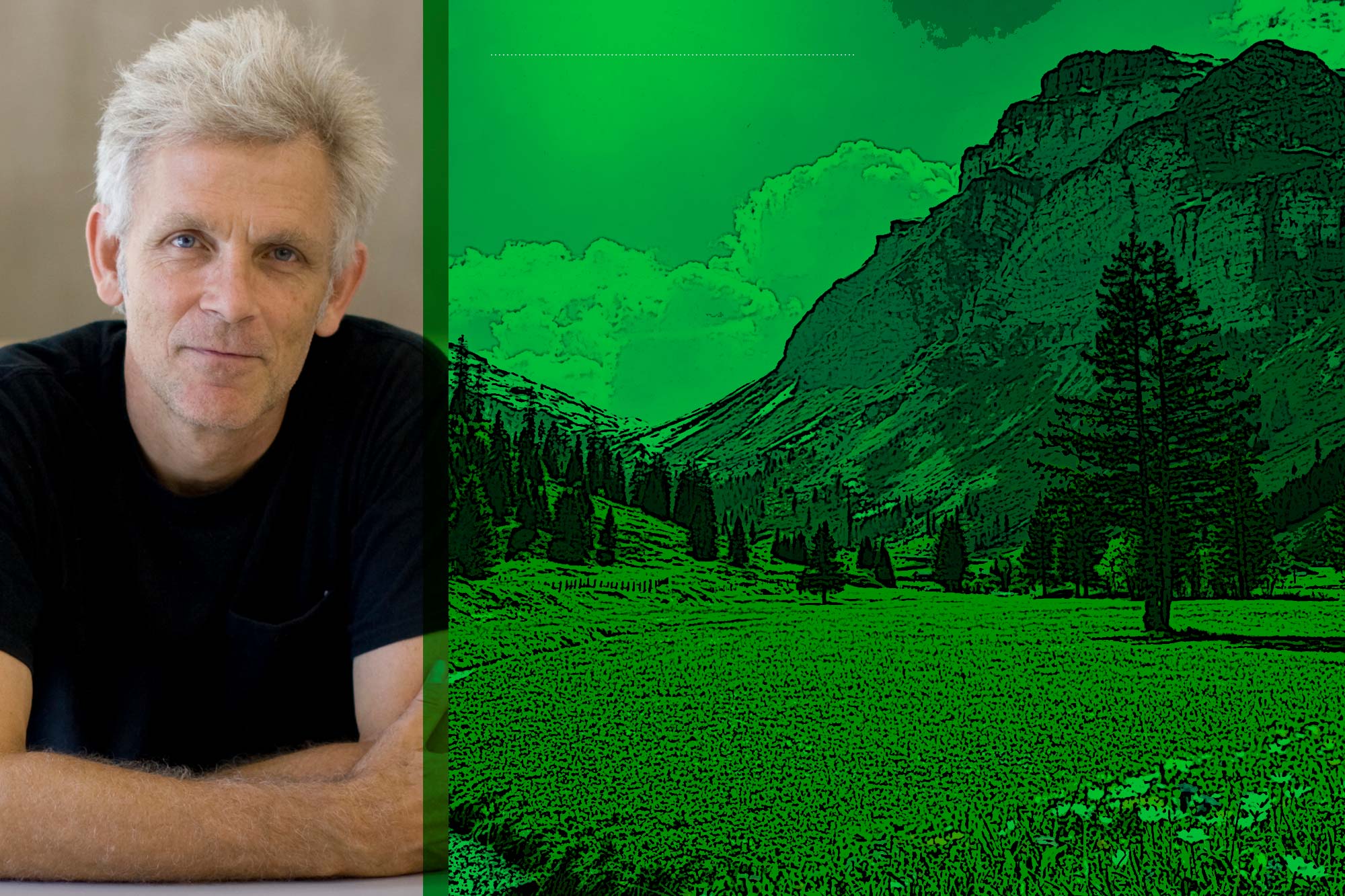 To center himself in times of crisis, art professor William Wylie turns to Primo Levi’s “The Periodic Table” about life before and after Auschwitz. (Photo by Jane Haley)
To center himself in times of crisis, art professor William Wylie turns to Primo Levi’s “The Periodic Table” about life before and after Auschwitz. (Photo by Jane Haley)
A book that has repeatedly helped center me over the past 30 years is “The Periodic Table” by Primo Levi.
Levi is best known as the author of “Survival in Auschwitz,” a lucid confirmation of humane intelligence when faced with Nazi brutality. Levi had studied to be a chemist before the war and the camps and went to work in a paint factory after liberation. ‘‘After Auschwitz I had an absolute need to write,’’ he says. ‘‘Not only as a moral duty, but as a physiological need.’’
“The Periodic Table” is an autobiographical story of his life before and after Auschwitz. It is a work of healing and of quiet, optimistic imagination. The 21 short pieces are each named for an element found on the Mendeleevian system chart. Levi used elements including argon, sulfur and carbon, both specifically, in terms of their unique chemical characteristics, and metaphorically in order to create a deeply compelling connection between the disparate worlds of physical and human nature. Early on, he points out that chemistry is not a “subject,” rather what happens when we breathe, when we touch, and when we react.
While each chapter is a treasure, my favorite is “Iron.” Dedicated to Sandro Delmastro, a fellow chemistry student before the war, the story of their friendship and Delmastro’s irrepressible spirit unfolds through their youthful climbing exploits in the Alps. Unlike Levi, Delmastro was at home in the mountain world, and at that time, 1939, he seemed most interested in testing his limitations and preparing himself (and Levi) for an unknown future. “To see Sandro in the mountains,” writes Levi, “reconciled you to the world and made you forget the nightmare weighing on Europe.” Levi ends the chapter revealing that the uncontainable Delmastro was among the first Resistance fighters murdered by Mussolini’s fascist thugs.
Outside of its obvious humanistic value, “The Periodic Table” was named the best science book ever written by the Royal Institution in London. Published in 1975, “The Periodic Table” beat out books by Richard Dawkins, DNA legend James Watson, Tom Stoppard, Bertolt Brecht and Charles Darwin to win the award.
Shannon Reres
Office of University Communications
Original Publication: UVA Today
You are using an old version of Internet Explorer. Our site is developed with the latest technology, which is not supported by older browsers
We recommend that you use Google Chrome for accessing our (or any) website. It is a FREE and modern web-browser which supports the latest web technologies offering you a cleaner and more secure browsing experience.